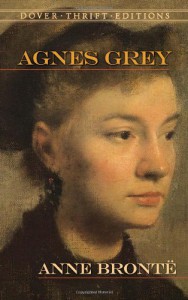Bookworm Blurbs
I absolutely adore reading - my love for books has had a huge impact on my life! I'm going to grad school to be a children's/YA librarian.
Agnes Grey

When her family becomes impoverished after a disastrous financial speculation, Agnes Grey determines to find work as a governess in order to contribute to their meagre income and assert her independence. But Agnes’s enthusiasm is swiftly extinguished as she struggles first with the unmanageable Bloomfield children and then with the painful disdain of the haughty Murray family; the only kindness she receives comes from Mr Weston, the sober young curate. Drawing on her own experience, Anne Brontë’s first novel offers a compelling personal perspective on the desperate position of unmarried, educated women for whom becoming a governess was the only respectable career open in Victorian society. (source)
This is another book that I was introduced to by the booklikes Classics discussion group. I'm not going to lie, when it was selected as our February read, I was a bit hesitant. I've only read one other work by the Bronte sisters, Jane Eyre (by Charlotte Bronte). I was not crazy about it. While I appreciated how dramatic it was, I thought Mr. Rochester was a total creep and I thought Jane was a complete idiot for going back to him in the end. I don't think I would have minded as much if it weren't for the fact that many people, my mother included, think the book is beautifully and tragically romantic. Personally, I find it to be sickening and a great example of what NOT to look for in a relationship. So, anyway, with Agnes Grey, I was concerned that I would find more of the same.
I could not have been more wrong.
The good news is, Agnes Grey is nothing like Jane Eyre. Agnes doesn't have a scandalous bone in her body. Agnes would never fall in love with her employer. The only person Agnes could ever love is a God-fearing man who values a respectable reputation and virtue above all else. The bad news is, this is one of the most preachy novels that I have ever read. Which meant that I liked it about the same as, if not less than, I liked Jane Eyre. Sure, Jane and Mr. Rochester were a horrible couple - but at least they were exciting! At least they kept me interested! At least with them, I couldn't wait to find out what happened next! Agnes, to be quite honest, nearly put me to sleep.
Agnes Grey is a young lady who naively decides that the perfect solution to her family's financial troubles would be for her to become a governess. She completely ignores her family and friends' warnings that she's just not cut out for the job. And, sure enough, they're right - but not once does Agnes admit that. She blames her misery on her charges and their parents. And it's true that the students are bratty little things and their parents are negligent. But, more importantly, Agnes has absolutely no control over her students. She has zero classroom management skills. And that, more than anything else, is the root of her problems. But instead of looking at least partially to her own flaws, Agnes blames her troubles on everyone else. As a result, she comes off as a self-righteous priss. The coup de grace of this preachy little story is that when Agnes grows up, she gets to marry her dream man, a pastor, and have three perfect children and live happily ever after. This provides a stark contrast to the adulthood of one of her students, Rosalie, who marries a man she despises and has only one measly daughter, poor thing. The message is clear: read your Bible, be kind to the poor, and live a good Christian life, or you'll end up like Rosalie.
My copy of the book included a mini-biography on Anne Bronte, and after reading it, it became abundantly clear that Agnes Grey is at least partially based on Anne. Like Agnes, Anne was also a governess, one who had several less-than-desirable charges. Like Agnes, Anne fell in love with a clergyman - unlike Agnes, Anne did not marry him. The biography highlights these similarities and even points out which family was the inspiration for each of Agnes' charges. After reading the biography, I definitely got the impression that Anne Bronte wrote this book not only to gain sympathy for other troubled governesses, but possibly also as an outlet for some pent up resentment of her former employers. She's kind of like the Taylor Swift of ex-governesses. And I don't really find that to be very mature.
This book is beautifully written. Although Anne Bronte does ramble at times, her word choice is exquisite and her intelligence is clear. I just wish that she'd written a more enjoyable story, one that was a bit less preachy and a bit more fun. This book isn't horrible. But it's hardly surprising that until last month, I had never heard of it. Agnes Grey is a mediocre classic that, in all likelihood, is only still being read today because of its author's last name.








 5
5  2
2